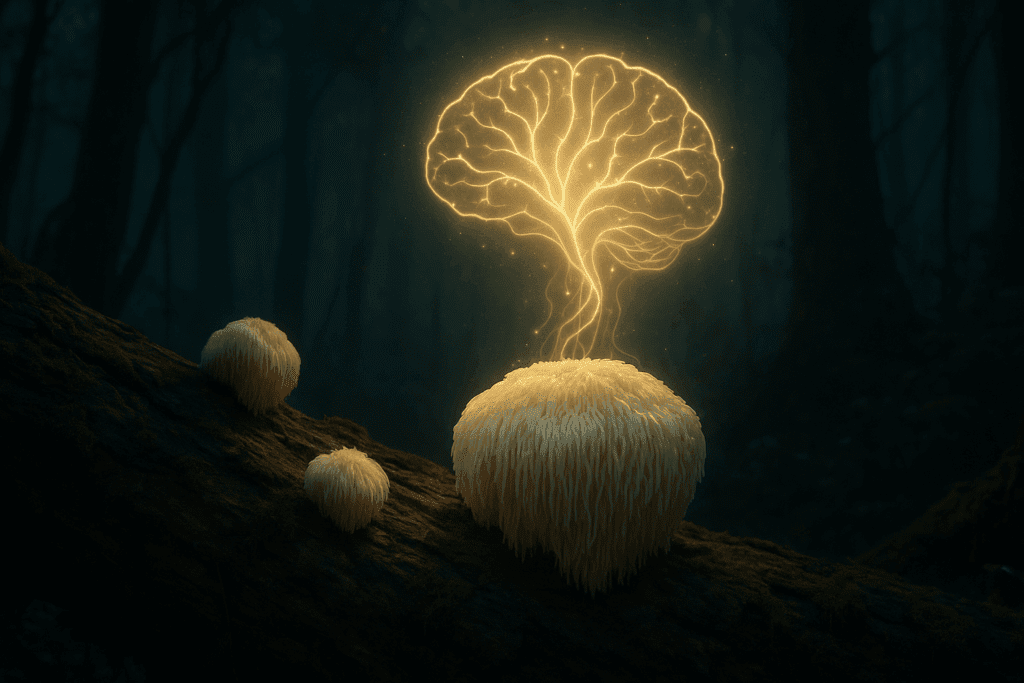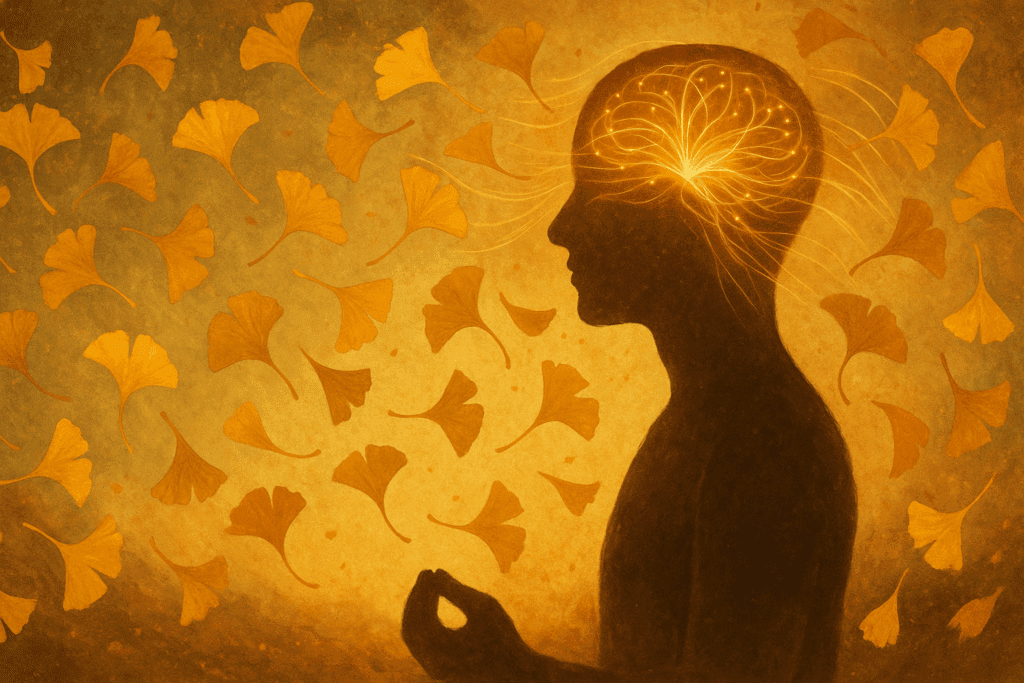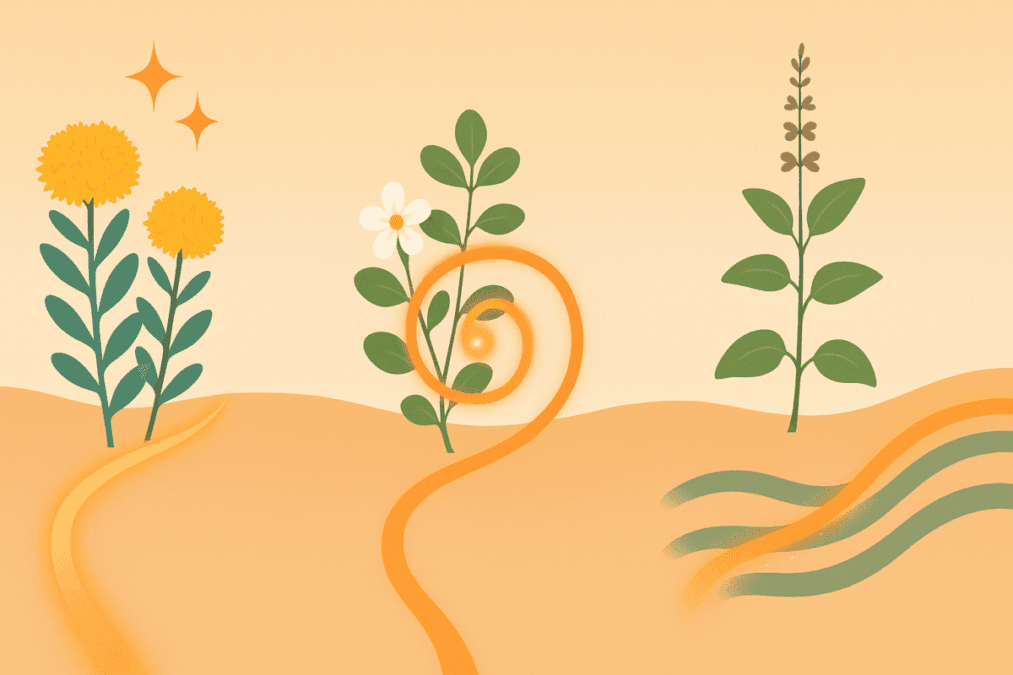ADHD, or Attention Deficit Hyperactivity Disorder, has long been discussed in the context of childhood behavior, particularly among boys. However, an increasing body of research reveals that ADHD in women often goes undiagnosed, misdiagnosed, or misunderstood due to subtler symptoms and different coping strategies. These include daydreaming, internal restlessness, and emotional dysregulation—symptoms that are often mistaken for anxiety or hormonal changes. This new understanding has led to a surge in interest in natural and evidence-based alternatives that support women with ADHD in ways that are both gentle and effective. Among the most promising solutions are science-backed herbs that target the brain’s executive functions, offering support for focus, memory, and emotional clarity.
You may also like: Best Herb for ADHD Support: How Natural Remedies and Herbs for ADHD Women May Help Boost Focus and Calm
Understanding the unique neurobiology of women with ADHD is essential when exploring herbal interventions. Hormonal fluctuations across the menstrual cycle, perimenopause, and menopause can significantly influence cognitive performance and mood regulation. These factors make it even more critical to identify herbs that not only enhance neurotransmitter balance but also support hormonal and neurological health. As science evolves, we can now better identify herbal candidates that may foster cognitive stability and improve brain flexibility—crucial for women aiming to stay mentally sharp into their 80s and beyond.
One of the standout features of natural herbs is their potential to improve good memory and focus without the side effects associated with conventional stimulant medications. These botanicals often work by modulating dopamine and norepinephrine—neurotransmitters closely linked to ADHD symptoms—while also offering antioxidant, anti-inflammatory, and adaptogenic properties. For women seeking to sharpen their minds, maintain power over their emotional responses, and optimize memory methods for studying or professional life, herbal support offers a gentle but potentially transformative approach.

Rhodiola Rosea: An Adaptogen for Focus and Fatigue Rhodiola Rosea is widely regarded as one of the most powerful adaptogenic herbs for combating stress-induced cognitive fatigue. Its active compounds, including rosavins and salidroside, are known to support mitochondrial energy production and reduce cortisol levels. For women with ADHD, Rhodiola may help enhance mental endurance during periods of cognitive overload or emotional turbulence. Studies have shown that Rhodiola can increase the ability to memorize, sustain attention, and remain emotionally resilient under pressure.
One unique benefit of Rhodiola is its dual action on both mental and physical stamina. This herb may be especially useful for professionals or students looking for effective memory methods for studying that do not involve overstimulation. In practical applications, Rhodiola is often taken in the morning to improve wakefulness and focus throughout the day. When paired with brain flexibility exercises, this adaptogen can further enhance how you challenge your brain and maintain a great memory under stressful conditions.

Bacopa Monnieri: Ancient Wisdom Meets Cognitive Science Known in Ayurvedic medicine as Brahmi, Bacopa Monnieri has been studied for its ability to support good memory, enhance cognitive performance, and improve attention span. It exerts its effects through bacosides—compounds that promote the growth of dendrites and synapses, thereby increasing neural connectivity. For women with ADHD, this translates into enhanced working memory and smoother task transitions.
Clinical research indicates that Bacopa supplementation may significantly improve attention and information retention, making it one of the best memorization techniques for learning new material. Its antioxidant properties help neutralize free radicals in the brain, which is especially important for long-term mental clarity. Integrating Bacopa into your wellness routine, along with tips for memorizing like spaced repetition and visualization, can help you sharpen your brain while supporting overall cognitive longevity.
Lion’s Mane Mushroom: Neurogenesis and Mental Clarity Lion’s Mane (Hericium erinaceus) is another powerful botanical that stands out for its neurotrophic effects. This functional mushroom stimulates the production of Nerve Growth Factor (NGF), a protein critical for the survival and function of neurons. Women dealing with ADHD often experience challenges with executive functioning and long-term memory recall. Lion’s Mane offers a unique solution by promoting neuroplasticity and supporting the brain’s ability to remember something fast and form new neural pathways.

This mushroom is also rich in erinacines and hericenones, which contribute to its ability to improve mental focus and reduce cognitive fog. When included in a daily regimen, Lion’s Mane can serve as one of the best study techniques for memorization, especially when combined with other methods like retrieval practice and flashcard training. It is particularly appealing for those who want to stay mentally sharp as they age, due to its protective effects on brain health and memory retention.
Ginkgo Biloba: Enhancing Blood Flow and Mental Processing Ginkgo Biloba is one of the oldest and most researched natural remedies for cognitive health. Its vasodilatory properties enhance blood circulation, particularly to the brain, thereby improving oxygen and nutrient delivery. For women with ADHD, this translates into improved attention span, enhanced memory, and better task-switching capabilities. Ginkgo’s ability to enhance good memory makes it a popular choice for those looking to remember information for a test or to memorize things fast for exams.
Scientific studies have demonstrated Ginkgo’s role in boosting recall speed and processing accuracy. This herb also shows promise in alleviating symptoms of anxiety, which often co-occur with ADHD in women. As one of the best memorization tricks for studying, Ginkgo can be especially helpful during periods of intense academic or professional demand. Taken regularly, it supports ways to sharpen your mind while contributing to overall brain health and mental power.

Gotu Kola: The Herb of Longevity and Neural Rejuvenation Gotu Kola (Centella asiatica) is another herbal remedy with a long-standing reputation in both traditional and modern medicine. Known for its role in improving circulation and enhancing connective tissue repair, Gotu Kola is increasingly recognized for its neuroprotective benefits. It supports collagen synthesis in the brain’s vasculature and contributes to enhanced memory function, making it particularly relevant for women looking to stay sharp as they age.
Gotu Kola contains triterpenoids that promote calmness and reduce anxiety—two factors that significantly impact attention and retention in women with ADHD. By improving blood flow and reducing oxidative stress, Gotu Kola also serves as an excellent support tool for those engaging in brain flexibility exercises. This herb offers a gentle yet effective means of enhancing mental clarity and executive functioning over time.
Holy Basil (Tulsi): Stress Reduction and Emotional Clarity Tulsi, also known as Holy Basil, is revered in Ayurvedic tradition for its adaptogenic and anxiolytic properties. For women with ADHD, managing stress is critical, as stress exacerbates distractibility and emotional volatility. Holy Basil helps regulate cortisol levels and promotes neurotransmitter balance, contributing to a calmer, more focused mental state.
Beyond its calming effects, Tulsi has been shown to enhance cognitive adaptability and improve response inhibition. These qualities are vital for women seeking ways to sharpen their minds and maintain emotional equilibrium in the face of daily stressors. When used consistently, Holy Basil can become an integral part of how you increase your brain power and sustain good memory across changing hormonal and environmental conditions.
L-Theanine: Gentle Alertness Without the Jitters Found naturally in green tea, L-Theanine is an amino acid that promotes alpha brain wave activity, resulting in a calm yet alert mental state. For women with ADHD, this balance is ideal, as overstimulation from caffeine or stimulants can often lead to crashes or heightened anxiety. L-Theanine supports how to stay mentally sharp into your 80s and beyond by facilitating deep focus without sedation.
Its synergistic effects with caffeine make it a great option for morning routines. When paired with study skills and memorization techniques like active recall and chunking, L-Theanine enhances your ability to memorize something overnight or even within 10 minutes. This fast-acting and reliable herb complements a wide range of cognitive enhancement strategies.
Practical Tips for Choosing the Best Herb for You Finding the best herb for ADHD involves understanding your own cognitive patterns, hormonal rhythms, and lifestyle needs. Women metabolize herbs differently depending on factors such as age, gut health, and stress levels. Consulting with a healthcare provider knowledgeable in botanical medicine can help tailor an herbal regimen that aligns with your goals for better focus, memory, and emotional regulation.
When selecting herbs, consider starting with one or two options, such as Bacopa for memory or Lion’s Mane for neurogenesis, and gradually introduce others as needed. Pairing herbs with lifestyle changes like regular exercise, a whole-food diet, and ways to challenge your brain through puzzles, reading, and mindfulness can magnify their effects. Remember, herbal support is not a quick fix but a long-term commitment to cognitive vitality and emotional balance.
How to Stay Mentally Sharp into Your 80s and Beyond Aging gracefully doesn’t have to come with cognitive decline. With the right herbal allies and holistic practices, it’s possible to stay sharp as you age and maintain great memory well into later life. Combining herbs like Gotu Kola, Ginkgo, and Lion’s Mane with daily habits such as meditation, journaling, and ongoing education can help preserve brain health and enhance neuroplasticity.
Research suggests that learning new skills, engaging in meaningful conversations, and practicing mindfulness are some of the best brain flexibility exercises available. These not only promote how to sharpen your brain but also reinforce the best memorization techniques over time. Whether you’re preparing to memorize for exams or simply wish to boost how you remember stuff when studying, herbs and healthy habits together form a powerful synergy.

Frequently Asked Questions: Science-Backed Herbs for ADHD in Women
What makes herbal remedies a compelling option for women with ADHD compared to conventional medications?
Herbal remedies offer a holistic and individualized approach to managing ADHD symptoms in women. Unlike conventional medications, which often involve synthetic stimulants, many herbs work gently with the body’s biochemistry to support focus and emotional stability. This approach minimizes the risk of dependency and adverse side effects, which can be especially important for women navigating hormonal fluctuations. Additionally, herbs can be tailored to enhance both mental performance and emotional well-being, which is critical for maintaining a good memory and achieving sustainable cognitive clarity. As more women seek integrative health solutions, herbs continue to gain popularity for their adaptability and long-term support for achieving great memory.
Are there any emerging herbs for ADHD that are not widely known but show promise in early research?
Yes, several lesser-known herbs are gaining traction in early research. One such example is saffron, which has shown potential in small studies for improving attention and emotional regulation in both children and adults. Another is celastrus paniculatus, sometimes called the “elixir of life” in traditional medicine, noted for its neuroprotective properties and early findings on improving cognitive performance. These herbs are not yet mainstream but offer exciting possibilities for women interested in sharpening their brain function and developing a great memory over time. As the science matures, these emerging herbs may become part of a broader toolkit for nurturing a good memory and supporting attention naturally.
How can herbs support emotional regulation alongside cognitive performance in ADHD management?
Many women with ADHD report that emotional dysregulation is just as disruptive as distractibility or forgetfulness. Certain herbs, such as ashwagandha and lemon balm, are known for their ability to support mood balance while also promoting alertness and focus. This dual effect makes them valuable tools in the holistic management of ADHD symptoms. Enhancing emotional stability directly contributes to better working memory and decision-making, as chronic stress impairs memory formation and retrieval. By creating internal equilibrium, these herbs indirectly support a good memory and can even contribute to the development of great memory through long-term use and lifestyle alignment.
Can herbal remedies be combined with brain training techniques for better results?
Absolutely. In fact, integrating herbal support with brain training exercises may significantly enhance overall outcomes. Herbs like bacopa and lion’s mane support neuroplasticity, which can be amplified through cognitive tasks such as memory games, strategic puzzles, and dual-task training. These combinations encourage the formation of new synaptic connections, helping the brain store and retrieve information more efficiently. When used consistently, this synergy not only promotes a good memory but also fosters the kind of neurocognitive environment needed to build and sustain great memory over time. Women can tailor their brain training routines to their unique needs and pair them with herbs that complement their learning style.
How long does it typically take for women to see benefits from taking herbs for ADHD?
The timeline for seeing tangible results varies depending on the individual and the herb in question. Some herbs, like Rhodiola Rosea, may offer noticeable benefits within a few days, especially regarding stress resilience and mental stamina. Others, like bacopa or gotu kola, tend to work cumulatively, requiring consistent use over four to twelve weeks for full cognitive benefits to manifest. Importantly, building a great memory through herbs is often a slow and steady process rather than an overnight fix. Patience, consistency, and lifestyle support—such as proper sleep, hydration, and brain-friendly nutrition—are key components to seeing lasting improvements in focus and good memory retention.
Are there gender-specific factors that influence how women respond to herbs for ADHD?
Yes, hormonal fluctuations throughout the menstrual cycle, pregnancy, and menopause can influence how women metabolize herbs. For example, adaptogens like ashwagandha may provide greater calming effects during the luteal phase, when progesterone levels are higher and mood swings are more common. Additionally, herbs that support circulation and oxygenation, such as ginkgo biloba, may be more beneficial during times of cognitive fatigue or brain fog related to hormonal shifts. These gender-specific responses highlight the need for personalized herbal protocols that align with each woman’s physiology. Recognizing these differences can make it easier to achieve a good memory and preserve great memory performance across the hormonal lifespan.
Can herbs help improve memory specifically for academic or high-stakes testing environments?
Yes, herbs like ginkgo biloba, lion’s mane, and bacopa have been studied for their memory-enhancing effects, particularly in test-based and academic settings. These herbs can support increased focus, faster information processing, and improved recall—factors that are critical for success in time-sensitive evaluations. Moreover, combining these herbs with memorization techniques such as retrieval practice, spaced repetition, or the method of loci can maximize results. In high-pressure environments, maintaining a good memory is often the differentiator between average and exceptional performance. Using natural nootropics strategically may contribute to developing great memory skills, especially when mental clarity and confidence are required on demand.
What role does diet play when using herbs for cognitive enhancement and ADHD management?
Diet can significantly influence the effectiveness of herbal supplements. Nutrients such as omega-3 fatty acids, choline, and B vitamins work synergistically with cognitive-enhancing herbs to support neurotransmitter balance and overall brain function. For instance, a diet rich in antioxidants helps reduce oxidative stress, thereby improving the absorption and efficacy of herbs like bacopa and gotu kola. Women seeking to maintain good memory and cultivate great memory are advised to include foods such as leafy greens, nuts, seeds, and fatty fish in their regular meal plans. A supportive diet not only strengthens herbal action but also creates the biochemical foundation for sustained focus and memory vitality.
How can women track the cognitive benefits of herbal use effectively over time?
Tracking cognitive changes requires a combination of subjective and objective tools. Women can start by keeping a wellness journal that includes notes on focus, mood, and memory performance on a weekly basis. Using brain-training apps or digital memory assessments every few weeks can provide quantifiable insights into improvements or plateaus. It’s also helpful to record how easily one can recall names, navigate complex tasks, or stay attentive during long meetings—all real-life indicators of a good memory. By consistently monitoring both subtle and significant changes, women can better understand which herbs are contributing to their great memory and cognitive resilience.
Is it safe to combine multiple herbs, or should women use them one at a time?
While many herbs can be safely combined, it is generally recommended to introduce them one at a time when starting a new regimen. This approach allows for the careful observation of how each herb affects focus, mood, and memory. Once individual tolerability is established, combining complementary herbs such as bacopa for memory, rhodiola for energy, and holy basil for stress can create a balanced and effective formula. Consulting with an integrative healthcare provider is essential to ensure safe combinations, especially if other medications are involved. With thoughtful integration, these blends can help cultivate a good memory and even accelerate progress toward achieving a consistently great memory profile.

Closing Thoughts: Honoring Neurodiversity Through Natural Support In embracing herbal medicine as part of ADHD management, women are reclaiming agency over their mental health in a way that is empowering, effective, and deeply aligned with the body’s rhythms. These science-backed herbs are not a one-size-fits-all solution but rather part of a personalized, evolving strategy to optimize cognitive function. With consistent use, proper guidance, and a commitment to lifestyle alignment, these herbs offer women a reliable path toward mental clarity, emotional resilience, and vibrant health.
As more women explore how to remember what you read for exams or how to memorize for a test without resorting to pharmaceuticals, the importance of evidence-based natural solutions becomes clear. By integrating these herbs with brain-sharpening practices, anyone can discover how to remember things while studying or how to stay mentally sharp even into their 80s and beyond. The journey toward better brain power, sharper focus, and good memory is not just possible—it’s already underway.


